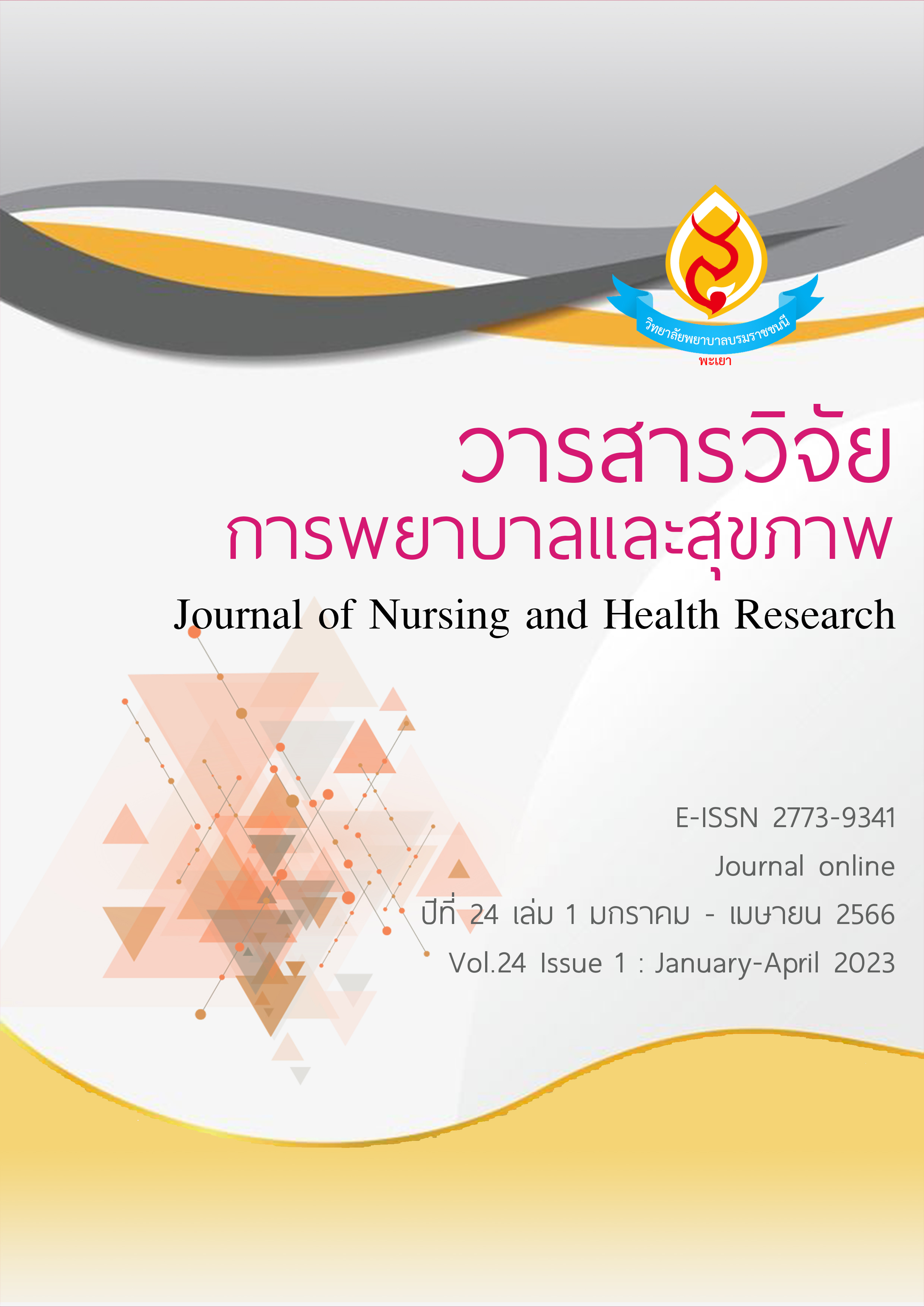ปัจจัยที่สัมพันธ์กับความรอบรู้ทางสุขภาพของผู้สูงอายุในชุมชนชนบท
คำสำคัญ:
ความรอบรู้ทางสุขภาพ, ผู้สูงอายุ, ชุมชนชนบทบทคัดย่อ
ความรอบรู้ทางสุขภาพเป็นปัจจัยพื้นฐานสำคัญที่ส่งผลต่อภาวะสุขภาพในประชากรทุกวัย โดยเฉพาะผู้สูงอายุที่มีความเสื่อมตามวัย วัตถุประสงค์ของการศึกษาครั้งนี้เพื่อศึกษาความรอบรู้ทางสุขภาพและความสัมพันธ์ระหว่างคุณลักษณะส่วนบุคคลและความรอบรู้ทางสุขภาพของผู้สูงอายุในชุมชนชนบท กลุ่มตัวอย่างคือ ผู้ที่อายุ 60 ปีขึ้นไปจำนวน 265 ราย ที่อาศัยอยู่ในชุมชนชนบทแห่งหนึ่งของจังหวัดเชียงใหม่ เก็บรวบรวมข้อมูลระหว่างเดือนมิถุนายน ถึง กรกฎาคม พ.ศ. 2562 เครื่องมือที่ใช้ในการรวบรวมข้อมูล คือ แบบบันทึกข้อมูลส่วนบุคคล และแบบประเมินความรอบรู้ทางสุขภาพในผู้สูงอายุซึ่งได้รับการตรวจสอบความตรงเชิงเนื้อหาโดยผู้ทรงคุณวุฒิจำนวน 6 คน ได้ค่าดัชนีความตรงเชิงเนื้อหาเท่ากับ .98 ทดสอบความเชื่อมั่นของเครื่องมือได้ค่าคูเดอร์ริชาร์ดสัน-20 เท่ากับ .79 วิเคราะห์ข้อมูลโดยใช้สถิติเชิงพรรณนา และสถิติไคสแควร์ ผลการศึกษา พบว่า ผู้สูงอายุร้อยละ 64.15 มีคะแนนความรอบรู้ทางสุขภาพโดยรวมอยู่ในระดับต่ำ ความสัมพันธ์ระหว่างความรอบรู้ทางสุขภาพและคุณลักษณะส่วนบุคคล พบว่า อายุและความเพียงพอของรายได้มีความสัมพันธ์กับความรอบรู้ทางสุขภาพอย่างมีนัยสำคัญทางสถิติ (p<.01) ผลการศึกษาครั้งนี้เป็นข้อมูลสำหรับผู้ที่เกี่ยวข้องในการดูแลผู้สูงอายุในชุมชนชนบทในการขับเคลื่อนกิจกรรมเพื่อการส่งเสริมความรอบรู้ทางสุขภาพโดยคำนึงถึงปัจจัยด้านอายุและความเพียงพอของรายได้ของผู้สูงอายุ
เอกสารอ้างอิง
กิจปพน ศรีธานี. (2560). ความสัมพันธ์ระหว่างความฉลาดทางสุขภาพกับคุณภาพชีวิตของผู้สูงอายุในภาคตะวันออกเฉียงเหนือตอนกลาง. วารสารวิจัยระบบสารธารณสุข, 11(1), 26-36.
กรรณิกา อุ่นอ้าย, พนิดา ชัยวัง, พรภิมล กรกกฏกำจร, และดวงใจ ปันเจริญ. (2565). ความรอบรู้ด้าน สุขภาพและพฤติกรรมการป้องกันโรคโควิด-19 ของผู้สูงอายุกลุ่มเสี่ยงต่อการเกิดภาวะสมองเสื่อมในชุมชนชนบท จังหวัดเชียงราย. พยาบาลสาร มหาวิทยาลัยเชียงใหม่, 49(1), 200-212.
ขวัญเมือง แก้วดำเกิงและนฤมล ตรีเพชรศรีอุไร. (2554). ความฉลาดทางสุขภาพ. กระทรวงสาธารณสุข กองสุขศึกษา กรมสนับสนุนบริการสุขภาพ. กรุงเทพฯ: สามเจริญพาณิชย์.
จิราพร เกศพิชญวัฒนา, สุวิณี วิวัฒน์วานิช, และชาตินัย หวานวาจา. (2563). ความรอบรู้ทางสุขภาพของผู้สูงอายุ ในชมรม/ศูนย์การเรียนรู้ผู้สูงอายุในเขตกรุงเทพมหานคร. วารสารประชากรศาสตร์, 63(2), 37-52.
นัฐธิรา ดวงจันทร์, เกษมณี อภิวัฒน์สมบัติ, ญาณิน แซ่ว้าน, ธีรภัทร์ กลมกลิ้ง, ปภัสสร มั่นบัว, ปริชาติ บันดาลปิติ, …,อัศนี วันชัย. (2565). ความรอบรู้ทางสุขภาพของผู้สูงอายุ ในชุมชนกึ่งเมืองแห่งหนึ่งในจังหวัดพิษณุโลก. วารสารการพยาบาล สุขภาพ และสาธารณสุข, 1(1) 28-39.
นัชชา เรืองเกียรติกุล. (2565). ปัจจัยที่สัมพันธ์กับความรอบรู้ด้านสุขภาพของผู้สูงอายุไทย. วารสารกรมการแพทย์, 47(1), 80-86.
มูลนิธิสถาบันวิจัยและพัฒนาผู้สูงอายุไทย (มส.ผส.). (2565). สถานการณ์ผู้สูงอายุไทย พ.ศ. 2564. นครปฐม: สถาบันวิจัยประชากรและสังคม มหาวิทยาลัยมหิดล.
เยาวลักษณ์ มีบุญมาก, กรรณิการ์ กิจนพเกียรติ, และจิริยา อินทนา. (2562). ความรอบรู้ด้านสุขภาพของผู้สูงอายุในชุมชนกึ่งเมืองแห่งหนึ่งในจังหวัดราชบุรี. วารสารเครือข่ายวิทยาลัยพยาบาลและการสาธารณสุขภาคใต้, 6(ฉบับพิเศษ), 129-141.
วิชัย เอกพลากร. (2564). การสำรวจสุขภาพประชาชนไทยโดยการตรวจร่างกาย ครั้ง ที่ 6 พ. ศ. 2562-2563. คณะแพทยศาสตร์ โรงพยาบาลรามาธิบดี มหาวิทยาลัยมหิดล.
วิมล โรมา, มุกดา สำนวนกลาง และสายชล คล้อยเอี่ยม. (2561). การสำรวจความรอบรู้ด้านสุขภาพของประชาชน ไทย อายุ 15 ปีขึ้นไป พ.ศ. 2560 (ระยะ ที่ 1), สถาบันวิจัยระบบสาธารณสุข. สืบค้นเมื่อ 14 กุมภาพันธ์ 2565, จาก https://kb.hsri.or.th/dspace/handle/11228/4926
AHRO. (2011). Health literacy interventions and outcome: an updated systematic review. Retrieved February 16, 2018, from https://doi.org/AHRQ Pub.No.11-E006-1
Ansari, H., Almasi, Z., Ansari-Moghaddam, A., Mohammadi, M., Peyvand, M., Hajmohammad, M., … Bagheri, F. (2016). Health literacy in older adults and its related factors: a cross-sectional study in Southeast Iran. Health Scope, 5(4), e37453. doi:10.17795/jhealthscope-37453.
Berkman, N. D., Sheridan, S. L., Donahue, K. E., Halpern, D. J., & Crotty, K. (2011). Low health literacy and health outcomes: an updated systematic review. Annals of Internal Medicine, 155(2), 97-107.
Cavazzana, A., Ro¨hrborn, A., Garthus-Niegel, S., Larsson, M., Hummel, T., & Croy, I. (2018). Sensory-specific impairment among older people. An investigation using both sensory thresholds and subjective measures across the five senses. PLoS ONE 13(8): e0202969.
Edelman, C. L., & Mandle, C. L. (2006). Health promotion throughout the lifespan (6th ed.). St. Louis: Elsevier Mosby.
Krejcie, R. V., & Morgan, D. W. (1970). Determining sample size for research activities. Education and Psychological Measurement, 30, 607-610.
Kutner, M., Greenberg, E., Jin, Y., & Paulsen, C. (2006). The health literacy of america’s adults: results from the 2003 national assessment of adult literacy (NCES 2006–483). U.S. Department of Education. Washington, DC: National Center for Education Statistics.
Li, C. & Guo, Y. (2021). The effect of socio-economic status on health information literacy among urban older adults: evidence from Western China. International Journal of Environmental Research and Public Health, 18(7), 3501. doi:10.3390/ijerph18073501
Mark, L. (2009). Health literacy and the elderly. Osteopathic Family Physician, 1(3), 64-69.
Meier, C., Vilpert, S., Borrat-Besson, C., Jox, R. J., & Maurer, J. (2022). Health literacy among older adults in Switzerland: cross-sectional evidence from a nationally representative population-based observational study. Swiss Medical Weekly, 152, w30158. doi:10.4414/smw.2022.w30158
Murman D. L. (2015). The impact of age on cognition. Seminars in Hearing, 36(3), 111–121.
Mubarokah, N. K. (2018). Health literacy and health behavior in the Rural Areas. KnE Life Sciences, 8-16.
Nutbeam, D. (2008). The evolving concept of health literacy. Social Science & Medicine, 67(12), 2072-2078.
Nurjanah & Mubarokah, K. (2019). Health literacy and health behavior in the rural areas" in the 3rd international meeting of public health and the 1st young scholar symposium on public health. KnE Life Sciences, 8-16. doi:10.18502/kls.v4i10.3702
Rasekaba, T. M., Pereira, P., Rani. G, V., Johnson, R., McKechnie, R., & Blackberry, I. (2022). Exploring telehealth readiness in a resource limited setting: digital and health literacy among older people in Rural India (DAHLIA). Geriatrics, 7(2), 28.
Smith, S. G., O’Conor, R., Curtis, L. M., Waite, K., Deary, I. J., Paasche, O. M., … Wolf, M. S. (2015). Low health literacy predicts decline in physical function among older adults: findings from the LitCog cohort study. Epidemiology Community Health, 20, 1-7.
Sumalrot, T., & Suksawai, H. N. (2015). Aging in the world of work: biopsychosocial perspectives. Panyapiwat Journal, 7(1), 242-254.
United Nations World Population Ageing. (2020). World population ageing 2020 Highlights. New York: United Nations Publication.
ดาวน์โหลด
เผยแพร่แล้ว
รูปแบบการอ้างอิง
ฉบับ
ประเภทบทความ
สัญญาอนุญาต
ลิขสิทธิ์ (c) 2023 วารสารวิจัยการพยาบาลและสุขภาพ

อนุญาตภายใต้เงื่อนไข Creative Commons Attribution-NonCommercial-NoDerivatives 4.0 International License.



